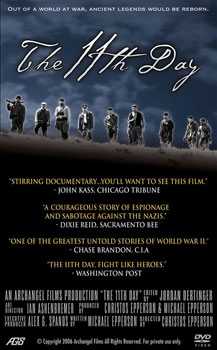The 11th Day: Crete 1941
| The 11th Day: Crete 1941 | |
|---|---|
 | |
| Directed by | Christos Epperson |
| Produced by |
Christos Epperson Michael Epperson |
| Written by | Michael Epperson |
| Cinematography | Ian Ashenbremer |
| Edited by | Jordan Dertinger |
Release dates | 2005 |
The 11th Day: Crete 1941 is a 2005 documentary film featuring eyewitness accounts from survivors of the Battle for Crete during World War II. The film was created by producer-director Christos Epperson and writer-producer Michael Epperson, and funded by Alex Spanos. Among the eyewitnesses are British S.O.E. operative and famous writer Patrick Leigh Fermor, and Cretan Resistance hero George Tzitzika. The non-veterans giving historical commentary include Chase Brandon of the CIA and Dr Andre Gerolymatos of Simon Fraser University.
Plot
On May 20, 1941, thousands of elite German paratroopers assaulted the island of Crete. It was the beginning of the Battle of Crete - the largest German airborne operation of World War II. They had expected to control the island within a few days; after all, they only needed to occupy Paris for a week before France surrendered. What they hadn’t expected was that the men, women, and even children of Crete would fight them to their dying breath.
Together with hundreds of stranded soldiers from Britain, Australia, and New Zealand, and a handful of British special operations commandos and US special operation paramilitary officers from the OSS (the precursor of modern day CIA Special Activities Division) who had parachuted in to help, the Cretan resistance afforded the occupying forces of Nazi Germany one of their most costly campaigns of the entire war.
Abduction of General Kreipe
They would even kidnap the German commandant of Crete, General Kreipe - the famous Abduction masterminded and led by British Special Operations Executive officers Patrick Leigh Fermor and Bill Stanley Moss. It was the only successful kidnapping of a German general throughout the war.
Newspaper reviews
Availability
In 2005, The 11th Day toured theaters throughout the United States and Canada. In November 2006, the film was released on DVD (with Greek and English language tracks and a photo gallery of over 500 images), and is currently available in libraries, stores, Amazon.com, etc. It can also be purchased from the official film website listed in the "External Links" section below. Also on the official film website, the producers have made freely available their vast collection of research material, including over 2000 photos—more than 500 of which are rare and unpublished. It is the largest on-line archive of World War II photos and documents in the world.
About the filmmakers
Producer-Director Christos Epperson is an award-winning director and documentary cinematographer whose work can be seen on the Discovery Channel. His production company, Archangel Films, is based in Sacramento, California.
Writer-Producer Michael Epperson earned his Ph.D. from the University of Chicago in 2003 and is the founding director of the Center for Philosophy and the Natural Sciences in the College of Natural Sciences and Mathematics at California State University, Sacramento where he is a Research Professor and Principal Investigator. His published works on history and philosophy include the books Foundations of Relational Realism: A Topological Approach to Quantum Mechanics and the Philosophy of Nature (Lexington Books / Rowman & Littlefield, 2013, ISBN 0-7391-8032-0) and Quantum Mechanics and the Philosophy of Alfred North Whitehead (Fordham University Press, 2004, ISBN 0-8232-2319-1).
The great-aunts and uncles of Christos and Michael Epperson were members of the Cretan resistance in World War II. In 1943, their uncle Kyriako Xirouhakis and his sisters Eleftheria and Rita joined the small resistance group led by Manolis Piblis in Hania. Eleftheria spoke three languages, including German, and worked in a German office where she had access to classified documents that she would copy, translate and pass on to her resistance group.
On June 11, at a wedding reception the Germans arrested the siblings except Artemisia who was a baby at the time. During the search of their house, the Germans found a diagram of the "Perivolitsa Camp" behind a painting on the wall. They interrogated the siblings and Eleftheria took responsibility for the diagram in order to protect her brothers and sisters. Her exact words according to German Lieutenant Volf Sinter were, "I am a spy, I work with the resistance group of Piblis and I will not reveal anything else."
They were all taken to the prison at the town of Agia where Eleftheria was severely tortured by the Germans Hoffman and Fritz Sterling to reveal her contacts in the resistance. During her interrogation, she was hung naked in the ladies room and beaten repeatedly for three days and nights, but did not reveal any information. There was a German guard next to her 24 hours a day to prevent her from sleeping.
On July 13, 1944 the Germans executed Eleftheria. Her last words according to the testimony of German nurse Fritz Nider who went to check that she was dead were, "Away with your dirty hands so you don’t pollute a Greek woman. Long live Greece."
Kyriako, Manoli and Dimitri were sent to the Dachau concentration camp and Rita was sent to another concentration camp somewhere in Eastern Europe. They all survived and returned to Crete after the war was over. The three brothers returned the same day their parents were having a memorial for them in the belief that they had died.
On April 4, 2004, the cultural group "Omonia" honored Eleftheria with a statue at the church grounds in Aroni, Crete.
The Epperson brothers' later production was Outpost Harry - a documentary that recounts the little-known story of how 150 Greek and U.S. soldiers stationed in a remote outpost defeated over 3000 Chinese infantrymen in one of the sieges of the Korean War. They were ordered to "hold at all costs" against an enemy that vastly outnumbered them and attacked their outpost every night for over a week. (See The Outpost Harry Survivors Association)